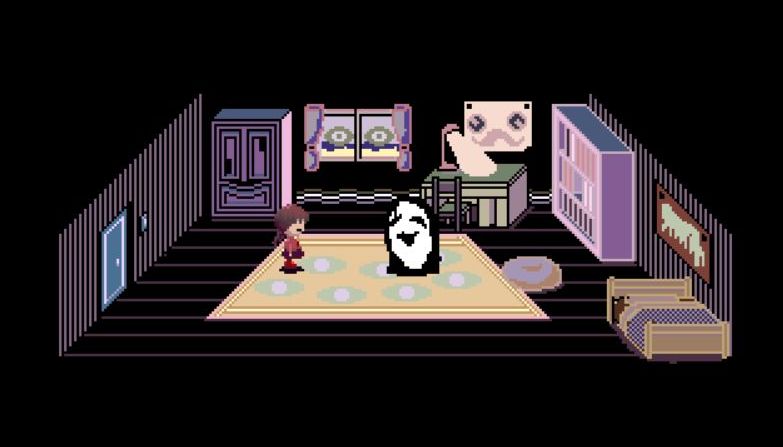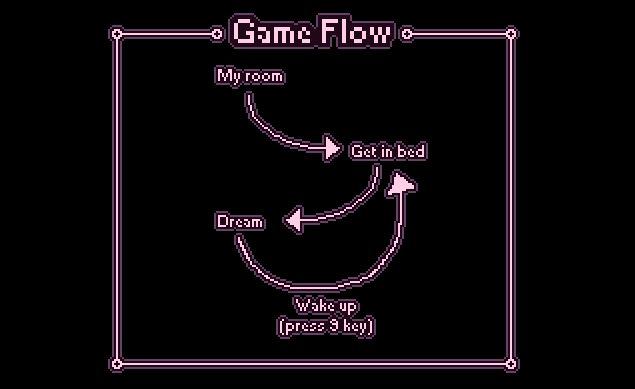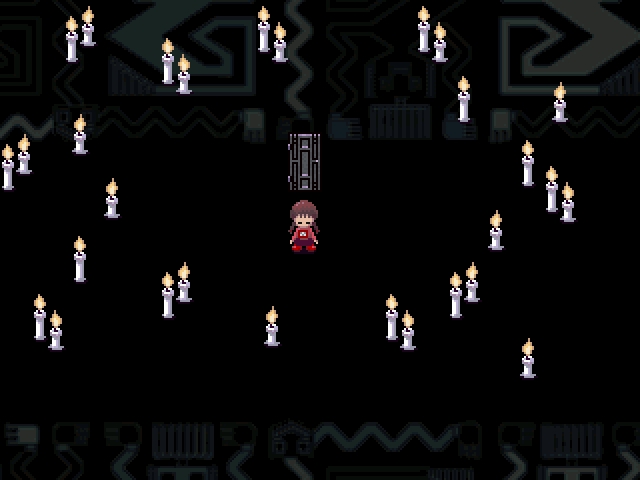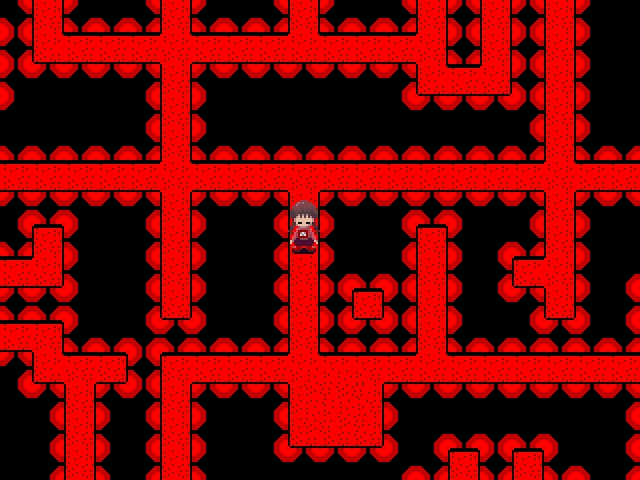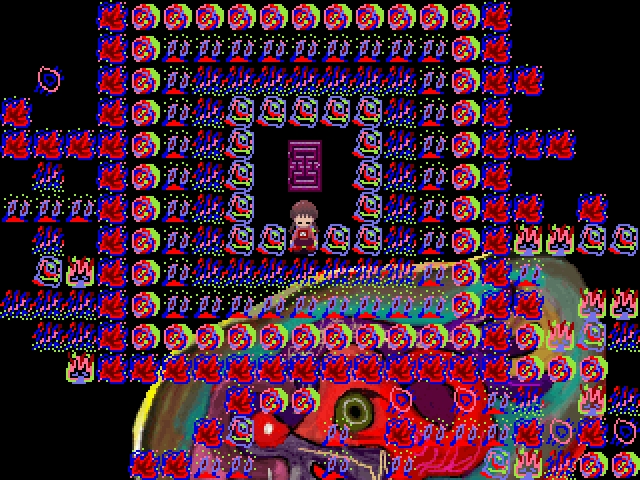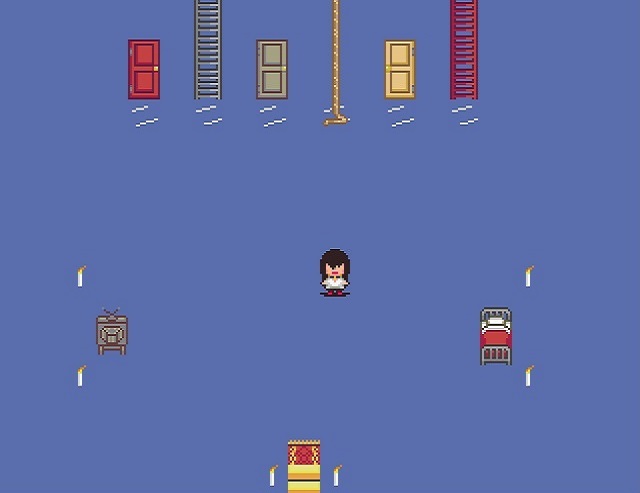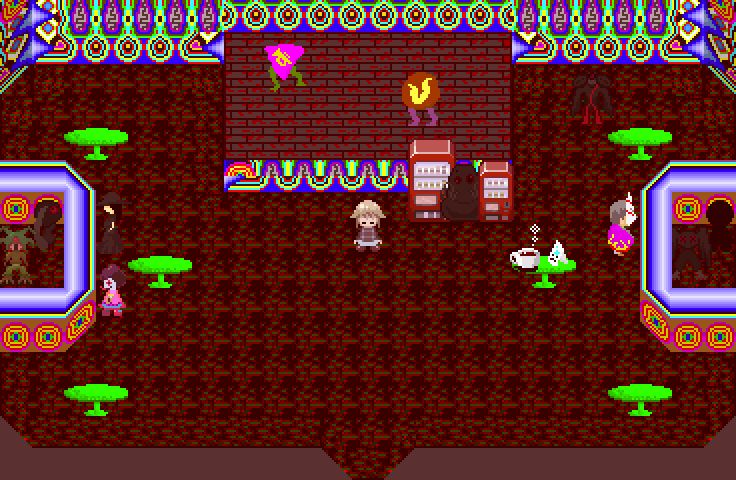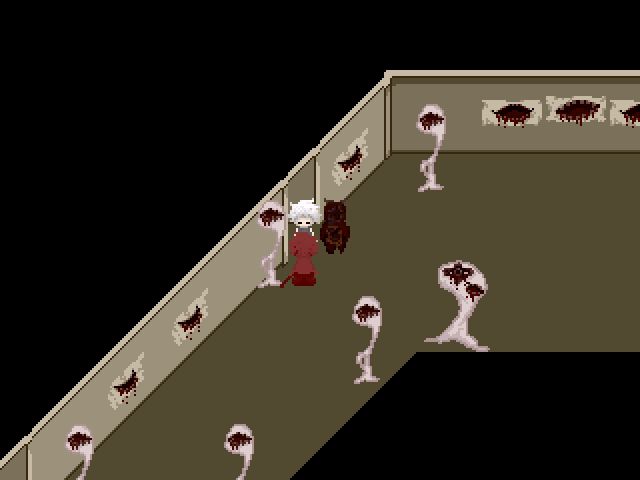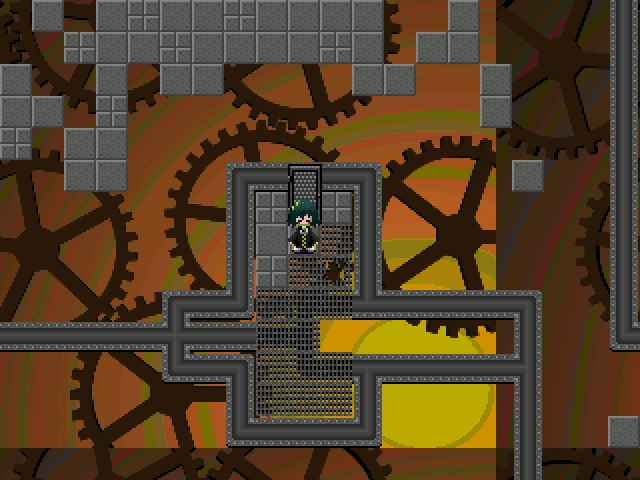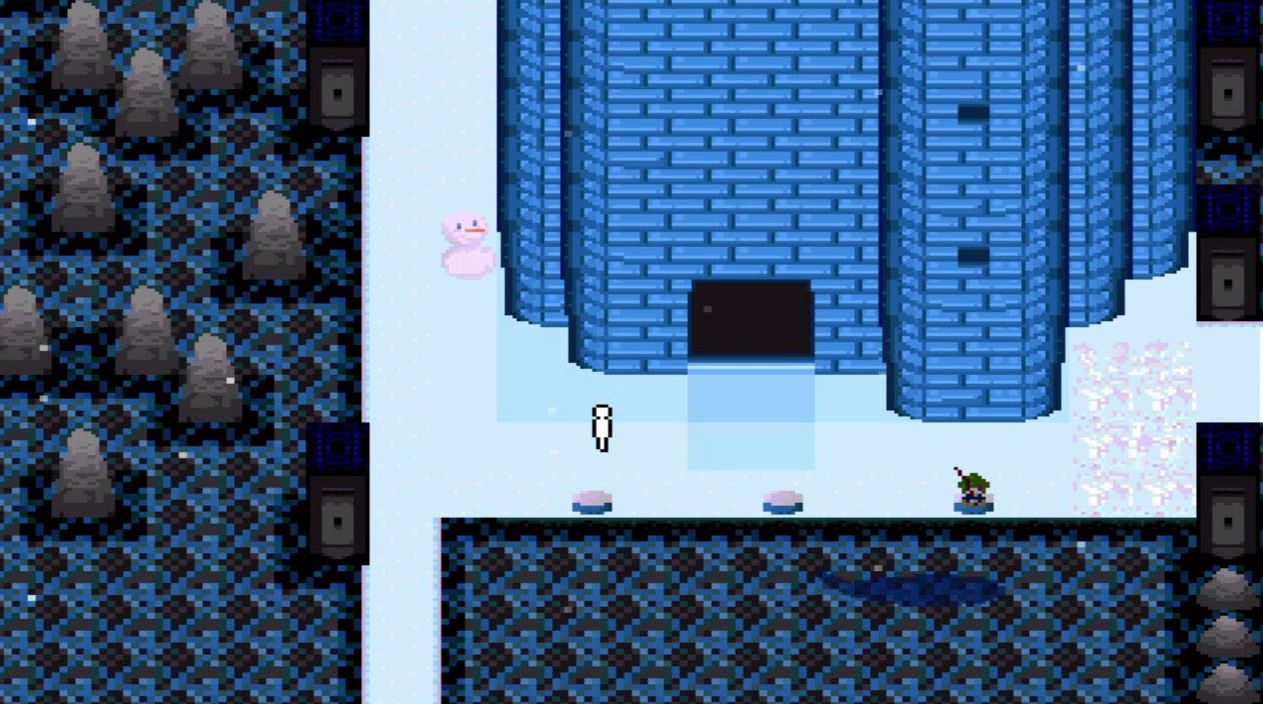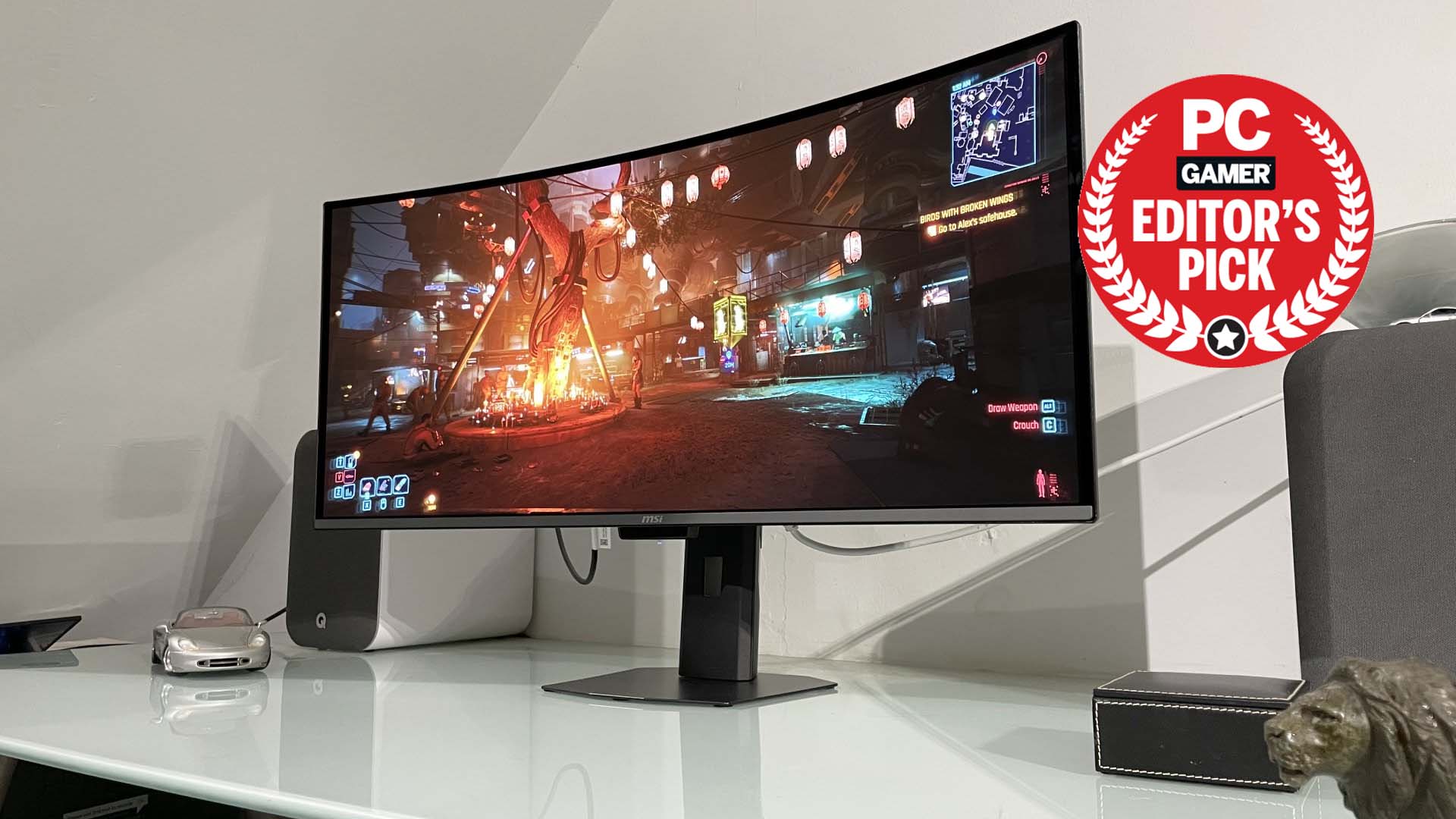The horrifying legacy of Yume Nikki, the homebrew game that became a phenomenon
Looking back at the history of one twisted RPG Maker creation and the games it inspired.
There is a girl in a room. She never goes out. Whatever is hidden behind her bedroom door, she doesn’t want you to know. She shakes her head, her drowsy expression unchanged, refusing to pull the handle. But in her dreams, she opens that door. Behind it, nightmares await.
Who is the girl? Why is she a shut-in? What is the meaning of the unsettling landscapes she explores every time she falls asleep? People have been debating this for more than a decade.
The girl in the room, Madotsuki, is the protagonist of cult indie game Yume Nikki, which means 'Dream Diary'. Released by Japanese developer Kiriyama in 2004, it was soon translated into English by a fan and can be downloaded here. There wasn’t much to localize. Yume Nikki doesn’t feature dialogue or plot, it only offers scarce menus and simple instructions. Go to bed, dream, wake up. Dream again.
Every time Madotsuki goes to sleep, she wakes up in an twisted version of her room. Everything looks the same, but the details are all wrong: the sky outside is an unnatural color, an eye blinks from the TV screen, and the door can now be opened.
Madotsuki is always alone.
Behind the door, other doors; a dozen of them, each leading to a different dreamy landscape. A forest made of neon lights. A snowfield. An abstract world of numbers and geometric shapes. A vast nothingness dotted with human remains. Those initial vast, looping maps have their own doors and passages that lead you to deeper, weirder panoramas, forming a vast interconnected space of dreams within dreams.
Human characters are scarce and deformed, like the monochrome pianist living in a spaceship or the green-skinned guy lying dead in the middle of a street. There is no way to interact with them apart from violence, no way to have a dialogue or a moment of human contact. In her dreams, Madotsuki is always alone.
Acts of aggression are possible thanks to the Knife, one of the many 'Effects' Madotsuki can find while exploring. There are 24 of them, hidden in nooks and crannies, and collecting them all is necessary to unlock the ending.
Keep up to date with the most important stories and the best deals, as picked by the PC Gamer team.
It was a walking simulator before walking simulators were a thing
Some Effects are useful: a bicycle to move more quickly, a hand that lets you return to the starting area, an umbrella that summons rain. Most are useless, though, like the one that makes Madotsuki blonde or the one that deletes her face.
The Knife, the only Effect you can use to confront your nightmares, ends up being the most worthless of them all. It can't be used to attack the aggressive monsters that force Madotsuki to wake up: she can only butcher the innocents, and the coins they drop are just worthless, grim mementos of her rage. Madotsuki can't level up, buy equipment or spend her money—Yume Nikki is a game without a true 'gameplay loop,' with no real reason to wander apart from curiosity. It was a walking simulator before walking simulators were a thing, and it felt lonely and mysterious in a time when the internet was just starting to feel crowded.
In an era that predated the overwhelming influence of Youtubers, Yume Nikki became famous thanks to the weird, memetic nature of its imagery. While complete let’s plays do exist (with LoudMan‘s one being one of the earlier, most popular examples), the most watched videos are the ones that reveal small secrets.
Where can you find the monochrome girl with an arm sprouting from her head? How do you board the spaceship that crashes on Mars, where a forgotten one-eyed monster cries underground? And how can you meet Uboa, the deformed, screaming face that has become its most well-known character?
The fandom isn’t made only of memes like Uboa. What kept the community together after more than a decade are the countless fan theories that try to explain all the weirdness found in the game. Because Yume Nikki is not just an abstract walking simulator: it’s a dream. And in dreams, everything has a meaning.
Some people theorize Madotsuki has been bullied. Others think she is the bully—or worse, a psychopath. Some people theorize that she’s an abuse survivor. It’s a voyeuristic exercise in psychoanalysis, a vivisection of a girl’s fantasies in a desperate attempt to understand why she is so broken.
Because she must be broken. Because there must be an explanation for all of this—for the gaping mouths, the monochrome cripples, for the spaceship crashing on Mars and for the girls with a bird’s face.
The Yume Nikki fandom has never received any explanations from the game's creator Kikiyama though, who may as well be a non-person, a mysterious figure who always refused to reveal any details about themselves or the meaning of their game. Without any canonical answers, the fandom has been left free to theorize.
Every time the fans get something resembling an explanation, they reject it. The spin-off manga and the light novel received a cool reception, and were criticized exactly because they tried to explain too much.
Even the Yume Nikki project, the website that handles the official merchandise, stresses that the additional material does not reflect Kikiyama’s original vision of the game. The manga and the novel are seen as alternate interpretations of the story, as valid as the various fan theories.
A fandom so fluid, so full of ideas and interpretations, would inevitably get into game making themselves. Yume Nikki, after all, was made in RPG Maker 2003, an engine with an easy learning curve. Fans became developers, coalescing theories and ideas into myriad fan games often as creepy and mysterious as Yume Nikki itself.
There’s the wonderful fan game people are trying to forget, because the creator asked to not speak about it. There’s the one westerners weren’t able to play for a while, because the creator put a Japanese password on the file as revenge from an art theft. There are others so charming and intricate they became their own thing, like Lisa the first, predecessor of Kickstarter success LISA - the painful RPG.
These fan games are not all just straight recreations of the original. The list of homages includes a metroidvania, a 3D remake, and even an unfinished fighter game where the characters from different fan games battle each other. Yes, the fandom is that big. The Yume Nikki Fangames Wiki meticulously keep tracks of fan games and at the moment of writing its directory contains more than 200 of them.
Here are some of the most interesting ones.
Yume 2kki
A collective effort three years in the making, Yume 2kki is a fan project born out of 2chan, the Japanese version of 4chan. It’s one of the oldest fangames and one of the biggest, with a massive (if uneven) amount of content.
The number of Effects is almost double that of the original, and some of them can be mixed to create new and ineffective, yet charming powers. Who doesn’t want to be a wolf on a bicycle?
.flow
A game about a computer, a girl, and a virtual world that may not be so virtual after all, .flow is one of the most polished fan games, and it’s not for the faint of heart. It’s much darker than its inspiration, featuring gore, hellish landscapes and eerie hospital imagery.
It closely follows the original Yume Nikki formula, but with a twist: the protagonist has an "evil self" you can unlock at a certain point, and playing as her slightly changes the whole experience. There are new areas to explore, but enemies become more aggressive.
Answered Prayers
If the concept of Yume Nikki intrigues you but you’re not a big fan of horror games, try Answered Prayers instead. This game about a girl praying at a shrine is one of the calmer fan works, with no jump scares and no creepy monsters.
The horizontal-scrolling levels in particular are a joy to stroll through. This is a game that doesn’t really want to be played, it just wants to show you one nice thing after another. It’s sadly incomplete, but nevertheless has a decent amount to enjoy.
Neftelia
Cute Japanese girls aren’t your thing? Try Neftelia, a fan game that replaces the anime-esque aesthetic of Yume Nikki with the minimalism of modern architecture. It’s an austere, precise art piece reminiscent of both Yume Nikki and of LSD: Dream Emulator, an obscure PS1 game about exploring procedurally generated low-poly dreams. There are no Effects to gather this time: your goal is simply to explore the levels to acquire small abstract movies for your collection. It has an equally eerie sequel, featuring a somewhat more ruined environment and even more bizarre movies to find, if after all of these you're still hungry for more.
